| �`60����̉p��ł�����ׂ���L�` |
|
| Last week Mr. N talked about a recipe, so today I copy him, I'll try to do, too. | |
| ��T�A�~�X�^�[�m����̓��V�s��b���Ă��ꂽ�̂ŁA�����͎����܂˂����Ē��킵�Ă݂����Ǝv���܂��B | |
| This is the first time for me. | |
| ���V�s���p��Řb���̂́A���ɂƂ��ď��߂Ă̂��Ƃł��B | |
| I'd like to use as many cooking words as I can, so I chose the following recipe. | |
| �Ȃ�ׂ���������̗����p����g�������̂ŁA���L�̃��V�s��I�т܂����B | |
chose�i�`���[�Y�j choice�i�`���C�X�j�̉ߋ��` the following ���L�� |
|
| A recipe for making "Cuttlefish tentacles croquette". |
|
| �h�C�J�����R���b�P�h�̍��� | |
a recipe for making �`�@�`�̍��� |
|
 |
�C�J�͕����Ȃ��i�j�̂ŁAleg�ł͂Ȃ��� �搶�i�ʔ����搶�ł��I�j���狳���Ă��炢�܂����B tentacle�i�e���^�N���j�G��ł��B |
| It's called "Ikageso korokke"in Japanese. |
|
| ���{��Łh�C�J�����R���b�P�h�ƌ����܂��B | |
| First let me show you the ingredients. | |
| �܂��A�ޗ��ł��B | |
| 2 cattlefish tentacles-they are leftover from fresh slices of raw cuttlefish. about 4 potatos or 400g half an onion 30g of carrot 1 egg |
|
| �C�J�����Q�n�C���[�C�J�̂��h�g���������A�������c��̂ł���𗘗p���܂��B ���Ⴊ���S�i�S�O�O�O�����j �ʂ˂����� �l�Q�R�O�O���� ��1�� |
|
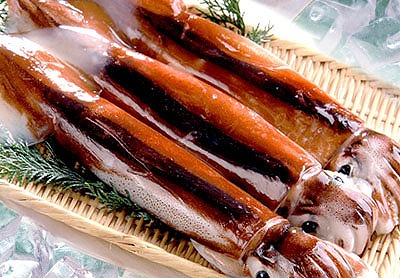 |
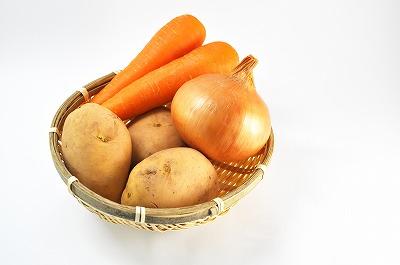 |
| Next I'll show you how to cook it. |
|
| ���ɂ��̍����ł��B | |
| �@Peel and cut the potatos, put them on the pot with water and put a pot on the stove. |
|
| �@���Ⴊ���̔���ނ��A���āA���ƈꏏ�ɓ�ɓ���āA�R�����ɂ����܂��B | |
���{��ł̓X�g�[�u�͒g�[���ł��� �p��ł̓R�����̈Ӗ��ƂȂ�܂� |
|
| �ABoil them on a high flame first, after simmer on a low flame until the potatos are soft. |
|
| �A���Ⴊ�����ŏ����ŎςāA���̌��炩���Ȃ�܂Ŏ�ŃR�g�R�g�ς܂��B | |
simmer�i�X�B�}�[�j��ł��Ƃ��Ǝς� swimmer�i�X�E�B�}�[�j�j���l�@�ƊԈ��Ȃ��悤�� |
|
| �BDrain the water off the potatos with a strainer, return the potatos to the pot, then mash the potatos with a masher. |
|
| �B���Ⴊ���̐��C������Ő�A��ɖ߂��āA�}�b�V���[�łԂ��܂��B | |
drain�i�h�D���C���j�r���ǁA�`�̔r�������� drain a pool �v�[���̐��� mash�͂��炩�����̂��Ԃ��� crush�͌ł����́i�X�₭��݁j���ӂ����Ɏg�� |
|
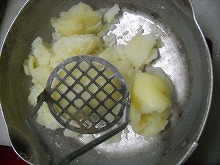 |
|
| �CChop the onion and carrot. | |
| �C�ʂ˂��Ɛl�Q���݂����ɂ��܂��B | |
| �DBoil the cattlefish tentacles in the solty water and cut them. | |
| �D�����ŃC�J��������łāA��܂��B | |
| �EBecause if we use raw cattlefish, they will blow up in the oil. |
|
| �E�Ȃ��Ȃ�A���̃C�J���g���ƁA���̒��Ŕj�邩��ł��B | |
| �FSaute the onion, carrots, cattlefish in oil, then add salt and pepper. I sometimes use currypowder instead of pepper. |
|
| �F�ʂ˂��Ɛl�Q�ƃC�J������u�߂āA�������傤���܂��B �@���͎��X�A�����傤�̑���ɃJ���[�����g���܂��B |
|
| �GMix the mashed potato and others, then devide them into 12 equal parts. |
|
| �G�Ԃ������Ⴊ���Ƒ��̕��������āA�P�Q�������܂��B | |
| �HCover them with flour, beaten egg, bread crumbs in turn. | |
| �H�����ɏ������A�n�����A�p���������Ԃɂ܂Ԃ��܂��B | |
beat eggs ���������������i��Ő���������܂��j |
|
| �IDeep fry them. �@�@It's ready to eat. | |
| �I��������ŗg���āA�o���オ��ł��B | |
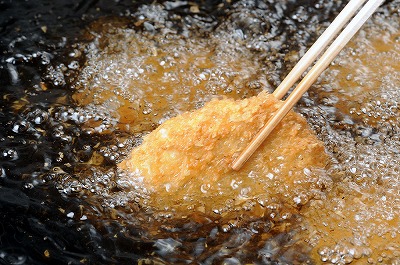 |
|
| I learned this recipe from my mother in the past. | |
| ���͂��̃��V�s��́A�ꂩ��K���܂����B | |
| She didn't waste any food. | |
| ��͐H�ו��ʂɂ��܂���ł����B | |
| She passed away , but her mind is always alive in my mind. | |
| ��͖S���Ȃ�܂������A��̐S�͂������̒��Ő����Ă��܂��B | |
| By the way, you know hard-boiled novel, don't you? | |
| �Ƃ���ŁA�n�[�h�{�C���h������m���Ă��܂���ˁH | |
| For example "Yaju shisubesi"by Haruhiko Oyabu is one of the hard-boiled novels in Japan. |
|
| �Ⴆ�A���M���F�́h��b�����ׂ��h�͓��{�̃n�[�h�{�C���h�����̂ЂƂł��B |
|
| Well, do you know why is it called hard boiled novel ? | |
| �ł͂Ȃ��A�n�[�h�{�C���h�����ƌĂ�Ă���̂����R��m���Ă��܂����H | |
| Actually I didn't know that until this morning. | |
| ���͍����̒��܂ŁA���͂��̂��Ƃ�m��Ȃ�������ł��B | |
| When I was reading a Tyuniti-newspaper this morning, I read an article about it by chance. |
|
| �����A�����V����ǂ�ł�����A���R���̂��Ƃɂ��Ă̋L����ǂ݂܂����B |
|
| It is famous that the origin of the word is hard-boiled egg. | |
| ���̌��t�̌��`���h��ŗ��h���Ƃ������Ƃ͗L���ł��B | |
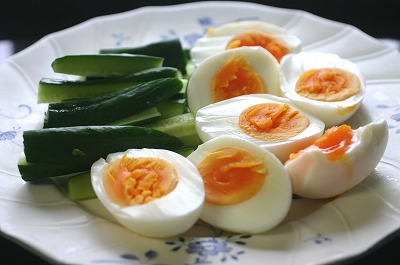 |
|
| The characters in a hard-boiled novel are tough and coldhearted guys. | |
| �n�[�h�{�C���h�����̓o��l���̓^�t�Ŕ��Ȓj�����ł��B | |
 |
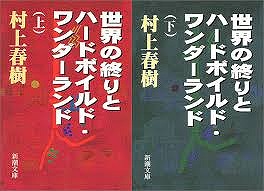 |
 |
 |
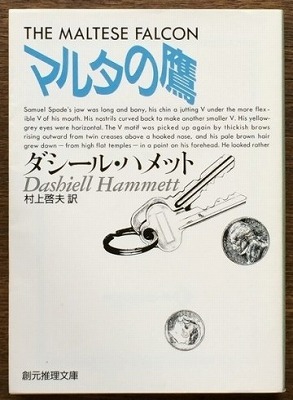 |
 |
| Then, why is it hard-boiled egg ? | |
| ����ł͂Ȃ��A���ꂪ��ŗ��Ȃ�ł��傤���H | |
| A key of the answer is "beat", English word. | |
| ���̓����͉p��́h�r�[�g"�ɂ���܂��B | |
| "Beat" means win. | |
| �h�r�[�g�h�̈Ӗ��͏��A�������A�ł��������ł��B | |
| Also it means that stir a raw egg. | |
| �r�[�g�͑��ɐ��̗�������������A���a����Ƃ����Ӗ��������ł��B | |
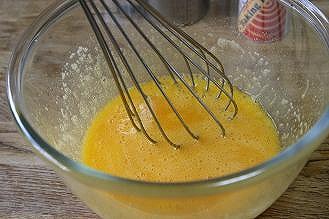 |
|
| We can't beat a hard-boiled egg. | |
| ��ŗ������������邱�Ƃ͂ł��܂���B | |
| That's why hard-boiled egg means tough guy. | |
| ����������ŁA��ŗ��̈Ӗ��̓^�t�Ȓj�Ƃ������ƂȂ�ł��ˁB | |
| It is a dull joke in English. | |
| �p��̃_�W�����ł��B | |
| According to our teacher, "hand-mixer" is Japanese-English, it's real name is "beater". |
|
| ���B�̐搶�ɂ��ƁA�h�n���h�~�L�T�[�h�͘a���p��ŁA�{���̖��O�́h�r�[�^�[�h�������ł��B | |
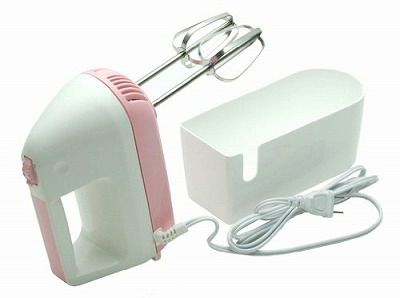 |
|
| Also "mixer ", it's real name is "blender". �@�@ I didn't know that. |
|
| �܂��A�~�L�T�[���{���̖��O�́h�u�����_�\�h�������ł��B �m��܂���ł����B |
|
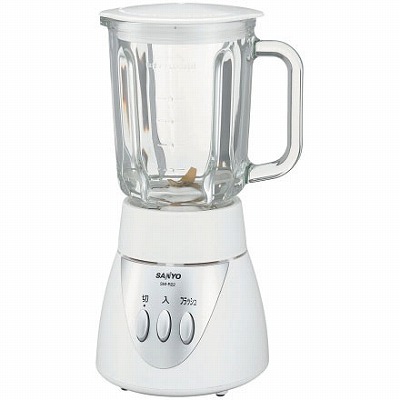 |
|
| He always teaches us some related things in just time. | |
| �搶�͂����֘A�������W���X�g�^�C���ŋ����Ă���܂��B | |
 |
|
| �Q�O�P�T�N�P�Q���P�O���i�j | �g�b�v�y�[�W�֖߂� |